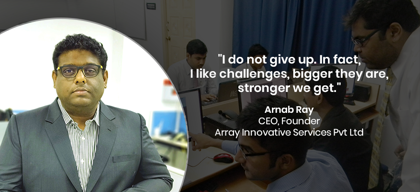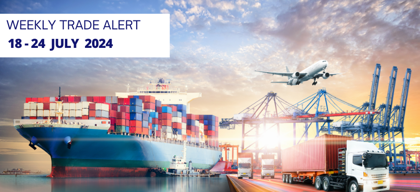Supply chains go green

Logistics & Supply Chain
114 week ago — 10 min read
Increased awareness about the need for sustainability, globally, is leading to a shift in the purchasing choices of consumers. Consumers are becoming increasingly conscious of where the products they consume are sourced from. Environmental and social issues related to products are becoming important purchasing criteria. According to a survey by Nielsen (2019), about 73% consumers would change their purchasing and consumption habits to reduce the impact on the environment. Many global companies are responding positively to this consumer demand by proactively undertaking initiatives by integrating ethical practices as part of their production processes, besides adopting responsible sourcing practices.
Retailers are the intermediaries between manufacturers and consumers. Therefore, they can play an integral role in accelerating this transition by influencing sourcing practices of commodities that are linked to deforestation by major players in their supply chain and awareness levels in their customer base.
The growing retail sector
The global retail industry has grown by 4.4% in the financial year 2019 with retail revenues reaching USD 4.85 trillion for the top 250 retailing companies. The Indian retail market is the fourth largest in the world and with the growing population and rising middle-class households, it is expected to reach USD 1.5 trillion by 2030.
Retailers, in particular, have seen increasing pressure from consumers, investors and society to address their sourcing practices with a growing shift towards ensuring sustainability in forest-linked commodities supply chains.
The retail sector globally is changing with online shopping becoming the norm and opening up new avenues for retailers. Additionally, retailers are also recognizing the need to move towards sustainability owing to increased consumer demand for sustainable products, growing investor pressure and with businesses integrating sustainable practices in their operations particularly more so with the emergence of the current pandemic.
Sustainability drivers in the retail sector
The current pandemic caused a havoc across global supply chains with 94% of the Fortune 1000 companies affected by it. The lack of global resilience and transparency has only exacerbated these disruptions. This has compelled businesses to rethink their approach and advance initiatives to build long-term supply chain resilience and sustainability.
A growing number of businesses have adopted voluntary commitments across thematic areas such as, climate change, water, sustainable supply to reduce their negative environmental impacts in their product supply chains. Responsible sourcing of raw materials and commodities derived from forests such as timber, pulp & paper, palm oil and soy is also an important part of sustainable supply chains.
Retailers, in particular, have seen increasing pressure from consumers, investors and society to address their sourcing practices with a growing shift towards ensuring sustainability in forest-linked commodities supply chains. As per a WWF report, risk management and brand reputation are material benefits of responsible sourcing, in addition to customer satisfaction and stakeholder engagement. The report also indicated that retailers see a clear link between responsible sourcing and business opportunities.
5 steps to making supply chains more sustainable
1. Join regional coalitions and multistakeholder platforms that promote sustainable commodities and deforestation-free supply chains
2. Set time-bound responsible sourcing goals and commitments
3. Publicly disclose data and commitments through transparency and disclosure tools
4. Develop and implement responsible sourcing policies
5. Adopt voluntary certifications and standards for sustainable supply chain
How retailers can promote sustainability in supply chains
The current supply chain sustainability landscape indicates that retailers that embrace the full scope of sustainability — going beyond legal compliance and deforestation-free commitments — maintain a competitive edge and stand to differentiate themselves from the rest within the retail sector.
The use of sustainably sourced materials in supply chains is an important goal that retailers are aiming towards. Various initiatives are being undertaken to achieve the goal which includes responsible sourcing commitments disclosed publicly with measurable, timebound targets, independent verification, adoption of transparency and disclosure tools for promoting sustainability within supply chains.
Publicly disclosed commitments on responsible sourcing that encompass broad sustainability criteria with measurable, time-bound targets and independent verification are associated with better implementation in practice, which in turn, delivers greater benefits to companies. Birla Cellulose by the Aditya Birla Group procures wood from sustainable sources in line with their policies. H&M has committed to using all Forest Stewardship Council (FSC) certified wood in their products and packaging and fibres from alternative sources such as agricultural residues by the end of 2025.
Many retailers have been regularly participating in transparency and disclosure tools. These include the WWF’s Palm Oil Buyers Scorecard (POBS) and the Soy Scorecard; RSPO’s Annual Communication on Progress (ACOP) Report and Climate Disclosure Project’s Forest 500 among others. These allow companies to publicly disclose their usage of some of the commodities used across their product supply chains and allow customers to make an informed decision. IKEA, Marks and Spencer, Tesco and Wal-Mart participate on POBS and report on the ACOP Report.
The use of sustainably sourced materials in supply chains is an important goal that retailers are aiming towards. Various initiatives are being undertaken to achieve the goal which includes responsible sourcing commitments disclosed publicly with measurable, timebound targets, independent verification, adoption of transparency and disclosure tools.
The use of technology in promoting supply chain traceability is also gaining prominence among retailers globally and in India. Retailers such as Welspun India, a global leader of home textiles, are using Wel-Trak, the company’s patented end-toend traceability technology to help stakeholders track raw materials throughout the supply chain back to their origin.
Many progressive retailers are seeing the benefits of responsible sourcing, especially using voluntary standards and certifications such as Forest Stewardship Council (FSC) and Roundtable for Sustainable Palm Oil (RSPO) to proactively identify and mitigate supply chain impacts. IKEA uses palm oil certified by RSPO. It also uses 98%* FSC-certified or recycled wood in its products.
The retail sector is strategically positioned to drive sustainability practices and voluntary standards through its leverage over product supply chains and influence on consumer choices. Retailers can influence consumer behaviour through in-store education and direct marketing. Their close relationship with suppliers also means that retailers’ purchasing power can be harnessed to move supply chains to more resource-efficient practices. In 2021, Amazon established a goal to collect environmental performance data from 200 suppliers by the end of the year. Working closely with suppliers can potentially lead to greater benefits for retailers, associated with better risk management and stakeholder engagement.
While global retailers have been ahead of the curve by undertaking initiatives and commitments for sustainable sourcing of commodities and deforestation-free supply chains, it is also important to highlight that this concept is new in the Indian market. Indian retailers are slowly and gradually understanding the need to set up policies for deforestation-free supply chains.
The road ahead
Research suggests that supply chain sustainability can benefit businesses in reducing their risks and increasing supply chain efficiencies. Indian retailers are also starting to take proactive steps to combat climate change and deforestation in their supply chains through various initiatives. Aditya Birla Group is increasing its investments in renewable energy along with Responsible Stewardship to procure sustainable goods. Similarly, other Indian retailers like the Future Group are also taking steps in encouraging environmental stewardship and responsible supply chains. However, there is still scope to increase the efforts to move towards sustainable supply chains. Tracking progress across global retail on sustainability is a good starting point for Indian retailers to identify the key areas of intervention, as part of their business operations. Additionally, more consumer awareness will help in eliciting more demand, which will eventually push businesses towards adopting better practices.
Also read: Why is supply chain digitisation a must for your business?
Article & image source: STOrai Magazine. Authored by Karishma Vohra, Sanjana Das & Bhavna Prasad. Karishma Vohra is a passionate sustainability practitioner and a Senior Expert for commodities and sustainable supply chains at WWF India. Sanjana Das is a Programme Officer for the Sustainable Business Division at WWF-India. Bhavna Prasad has over 17 years of diverse experience ranging from banking, environmental consulting to working with environmental NGOs and multilaterals. She currently leads WWF-India’s business engagement on sustainability.
Disclaimer: The views and opinions expressed in this article are those of the author and do not necessarily reflect the views, official policy or position of GlobalLinker.
Most read this week


















Comments
Please login or Register to join the discussion